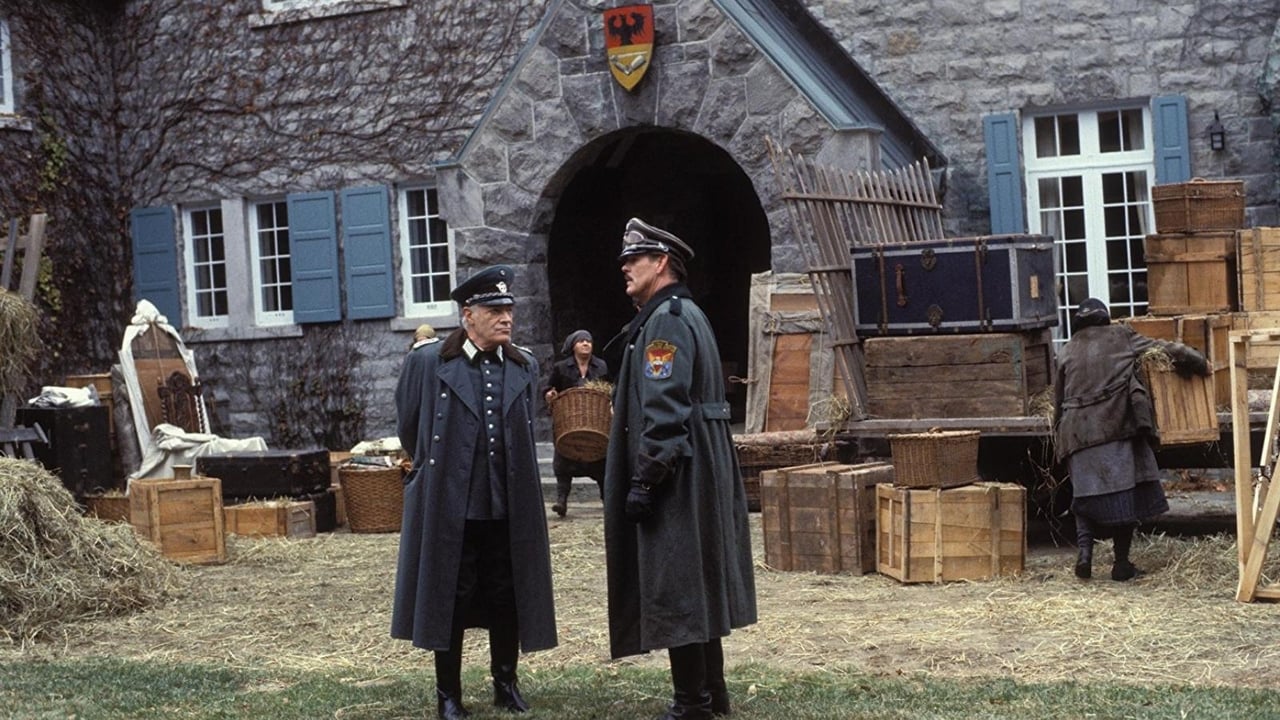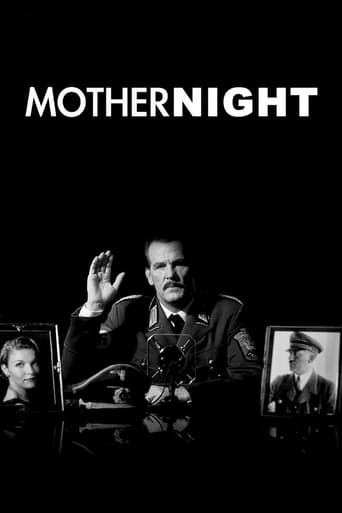Leftbanker
Mother Night is the best film adaptation of a Vonnegut novel and a truly great film written by a great American treasure. It is a brilliant tale that also lends itself to an abbreviated film version. The film is wonderfully faithful to the novel but this doesn't mean you shouldn't rush down to your local library and check out Mother Night.One of the drawbacks of scaling down a novel for a screenplay is, of course, what is omitted. One of the most charming parts of the book was how Campbell's works were recovered by a Russian who spoke German who later plagiarized them in Russian to wide appeal. The man was later executed, not for stealing the ex-Nazi's works but for writing his own critique of the Red Army.Hats off to the cast.
dimtrav-1
Having recently reviewed the DVD with Nolte's comments I must add a little explanation for the other reviewers who never got the motivation behind Campbell choosing to follow through with the spying.Campbell is a romantic through and through, he sees the action of spying in all its media created romance and not in the hard bitten truth that exists in real life. His relationship with Helga is just one more aspect of this romantic attitude and Helga is not at the center of his universe for long. Too many humans still consider war a romantic ideal filled with "action" and "heroes." Humans forever tell themselves that they are full of good intentions, that we mean well and so does Campbell. He never truly understands how his part in the war (the little devices created for him that somehow offer information to the allies) fits in but most of all he fills a role, a role of a lifetime on a huge international stage he is by career a actor/playwright and there is simply no bigger role he could take. Again fulfilling a "romantic ideal." But by playing the role as anti-Semitic propagandist he becomes so close to that role that he cant even separate himself from it, he becomes the role. Another "romantic ideal." But his being manipulated because of this romantic leanings leaves him empty inside and longs for real life. The contact "with the secret" John Goodman's role as the blue fairy godmother does appear and save him from himself a couple of times, but ultimately cannot in the end save him.This is an excellent cast and Vonnegut's novel is entirely intact and he does have a walk on non-speaking appearance toward the end. But this film is for the thinking audience not the shallow end of the mental pool.
stodruza
This movie is a disappointment of Kurt Vonnegut's breezy and engaging novel, for the simple reason that it lacks what the novel has. Mother Night is a better story than The Pianist, so why didn't it win the academy award? The beauty of the book is in its grace and flow, and in the irony we share with the protagonist, not the premise which Vonnegut himself does not strain to prove, just kind of lets it kind of hang there. It would have been an intelligent hand indeed to guide this film away from the major premise that Vonnegut insists on in the foreword of the book, and himself does not insist on proving too thoroughly.The novel has a life of its own outside the premise, and that life is muted and distorted almost completely in the film, by the full commitment to the fulfilling of that premise.Vonnegut stated the premise himself, explicitly, so it must be true. "We must be careful who we pretend to be, because we become who we pretend to be" But a close examination of the book can reveal to a sensitive reader that it's beauty lies not in the major premise, but in the humanity that the reader shares with the protagonist through intense irony throughout. Vonnegut's genius doesn't hurt, but the truth of the matter is that for the most part the premise as it is stated by Vonnegut falls by the wayside to no detriment of the humanistic, ironic, and mind boggling developments, and, yes, finally implications of the novel itself.The story in the book is uplifting in the end, unless you truly believe the last sentence, and in the film it is a downer. The melodramatic hoops this film is forced to jump through is unforgiving. From the sappy music that underscores almost every scene without which the scenes would not "work," to the absolutely worst scene in the film where Resse commits suicide, this film cannot find it's center and, I think, it is because, interestingly, that center is not in the book. The film looks for it, looks for it in various climaxes, like when Resse commits suicide, fitfully and futilely I might add, and Howard J. Campbell's personal demise, but those climactic scenes don't climax the film as a whole because even in the book they are not meant to.To me, Campbell getting his pardon at the end is the pay off to the patient, expectant, and empathetic reader, but in in the film what we see is a guard blowing cigarette smoke over Cambell's dead body. The premise is proved, but I would sincerely ask to what effect? Amazingly, the most amazing thing about the film is Vonnegut's cameo, that is, if you know what he looks like before hand. The film, moment by moment, sucks all of life out of the book, that which gave it an easy breeze of self-confidence and made it exhilaratingly light reading, despite the subject. What it lacks gravely is the élan vital, and again the irony, of the book which for various reasons has it and the film does not.I hope I have at least begun to make the case that the permeating premise is the fait accompli that is the ruin of this project. What the producers achieve by taking and holding the story in its death grip is unfortunately what they got.
Michael Fisher
If you've read Mother Night and enjoyed it so much (as I did) that you just have to see the movie, understand that you have to understand a fundamental element of Vonngut's writing - that beyond his story lies Vonnegut himself, and that you can't put a human mind on the screen. His whit and humor just cannot be transcribed by a screenplay or even the best acting performance. I believe that this movie exceeds in asking the key questions that Vonnegut poses in his book, but those frequent cynical moments of satire found on the page are not found on the screen. Does this mean that the movie misses the mark? Of course not. In my opinion, the movie succeeds because it does not try to recreate the experience of reading the book (this is not a medium for those too lazy to turn a page). It succeeds because it takes the fundamental elements of a story created by one of America's true artistic treasures and presents it in a a framework without pretense. I've seen other movie versions of Vonnegut books where the director obviously tries to channel Vonnegut's genius and loses grip on his own craft. I would not place this movie as one of the best I've seen, but it stands on its own legs as one well worth watching. By taking Vonnegut's "voice" out of the movie's narration or trying to insert it however it can, Mother Night tells his story brilliantly, and preserves the story's fundamental lessons without confusion, distraction, or disappointment.

